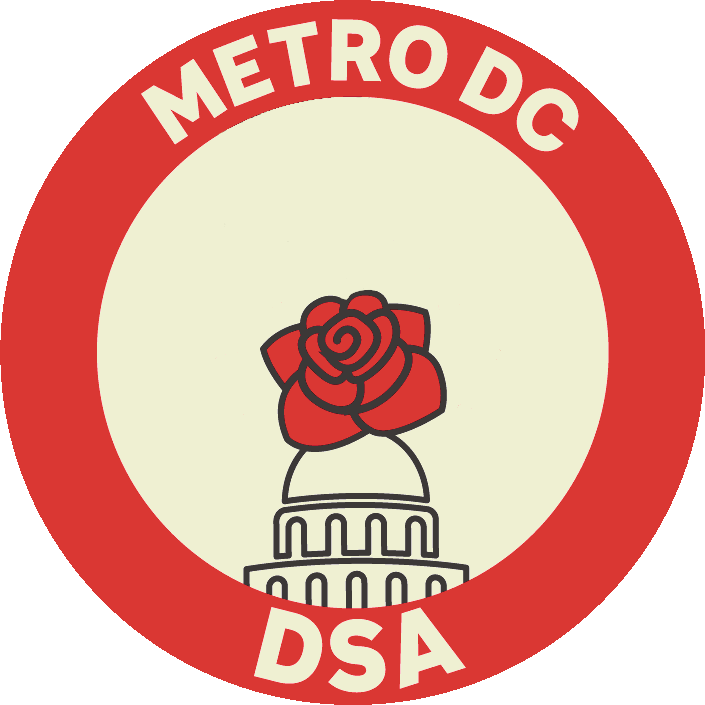

Alexandria residents pass "People's Ceasefire" resolution


“Doing this Job According to the Schedule is Impossible”: An Interview with Bus Operator/Assistant Shop Steward Jack Watkins
At the start of the COVID pandemic, AC Transit cut bus service dramatically. The District has been slow in spending budgeted funds toward restoring cuts because it lacks the workforce to operate additional service. The same hiring and retention crisis faces many other transit agencies, and impacts other sectors like education and healthcare, as well.
At AC Transit, one of the major drivers of the retention crisis is bus schedules that don’t build in enough time to ensure workers get a break to stretch, use the bathroom, or eat a meal. Nathaniel Arnold, vice president of Amalgamated Transit Union (ATU) Local 192, spoke at the April 24 board meeting about the dire situation, expressing the union’s frustration that the agency has “not been putting the time on the runs that they said that they were going to,” and adding, “We’ll be able to retain our workforce by also making better working conditions for them so that they don’t leave.”
AC Transit’s board has called a special meeting on Wednesday, June 5, as part of its service realignment initiative. The issue of schedules that don’t work for bus operators and are unreliable for riders will be a major topic of discussion. A petition for workers and riders is circulating this month, and the union is calling on its members, and riders who support them, to turn out on June 5.
Majority spoke with ATU 192 member, AC Transit bus operator and assistant shop steward Jack Watkins about the stakes in the struggle for better schedules. – The Editors
Majority: What’s the problem with the schedules? What impacts are they having on you and your co-workers as bus operators?
Jack Watkins: The schedules are designed to be unsustainable. They’re designed to place subliminal stress onto the driver to where we internalize the necessity to make it to the end of the line [on time], with the implicit understanding that we know that it’s not possible to do safely. And that gets coupled with the [AC Transit] District constantly putting out “drive safely, drive safely,” to cover themselves. They put up paperwork and memos around driving safely, but then they create schedules and cut time off of the schedules, and create a situation where they know that it’s impossible to do that, and they expect us to silently adhere to that, to walk that impossible tightrope. And that eats into our mental health, our physical health and the way that we’re able to show up for the community.
Majority: Talk more about the impacts on the drivers.
JW: Most simply, we are pressured to strategize when and how to step away from the bus and take a moment to breathe. When we get to the end of the line, we’re often feeling that pressure of calculating to the minute how much time we have to find a bathroom, use the bathroom, come back from the bathroom and get back to that bus. So that we can make that next trip on time. The same regarding our ability to take breaks to recover mentally, to have water, and to have food. I know drivers that say that they don’t get the opportunity to eat their lunch so often that they’ve stop packing lunches. And then when they get off work late they end up stopping to get some fast food on the way home which negatively affects their bodies. With us having a sedentary job, we do try to plan for our mental and physical health needs, and that gets undermined by trying to maintain the schedule because even if we pack a salad or something that is nutritionally beneficial to us, we are often unable to eat it and we find ourselves eating when we get off work late at night, which throws off any healthy routine.
And also our mental health is messed up because we do a good amount of mental math at all times in addition to driving: our brain power is used up doing math to figure out how long it’s gonna take to get from one time point to the next time point. “I have to make it from Seminary and MacArthur down to MacArthur and Fruitvale in five minutes. How can I do that?” Driving safely and doing that is impossible. On a busy day or even at nighttime, it’s impossible to make it that many miles in five minutes with the lights and all that stuff while trying to drive safely. Calculating the risk-reward with me running through this yellow light? Keeping our heads on the swivel looking out for other cars driving around us and making sure that we maintain a safe distance from other vehicles. How fast are we trying to pull off from red lights or stop signs? We’re compromising all of these safety aspects, trying to maintain the schedules which is unreasonable. And it’s this pressure that goes unaddressed. Management functions in a space where they’re able to pretend it doesn’t exist.
Majority: How do the unsustainable schedules affect your riders?
JW: Bus drivers make decisions to pass up passengers, particularly disabled passengers, passengers in wheelchairs. Not a week goes by that I don’t have somebody in a wheelchair that says the last bus passed them up. I believe that is a calculation that the bus drivers are making based on trying to maintain time. Every day, a passenger says “hey, this bus passed me up,” if not the bus directly in front of me a bus earlier today or a bus on a different line.
In addition to the way that we treat the passengers when they get on the bus with a pocketful of change, the immediate reaction to every bus driver that I know when they think about a passenger with a bunch of pennies is, “oh man, they’re so slow,” and that in itself is evidence that they’re thinking about the speed at which they can operate the bus. And the passengers feel that; we treat the passengers like they’re a nuisance or we treat them like we’re rushing them. When I talk to passengers about my personal actions they talk to me about how they wish bus drivers were nicer to them, or they wish that bus drivers would take more time with them. The passengers regularly will apologize preemptively about doing regular things because they have been mentally trained to feel like by default they are going to be an inconvenience to the bus driver.
Majority: How do the schedules impact attendance by operators?
JW: We get burned out. I said to myself the other day, “Man, I wish I could call off today. I’m tired. Oh man, this day was really really stressful for me.” And a sizable amount of that stress comes from the constant act of doing all this math, finding these shortcuts, risk-reward, safety measures, all in effort to maintain these schedules. In addition to driving the bus, traffic, passengers, mental health, all of these things. That pressure from the schedules is making a job that’s already difficult, far more difficult. And so people decide, “hey, I might not even have any hours available to take off but I’m calling off because I CAN NOT do this tomorrow.” And that’s when people have to make a difficult decision between their mental health and their ability to feed their families. And that’s a position none of us should have to be forced in to. And sometimes they end up making the decision to just come in to work because we need the money, but ultimately in a largely unfit position to drive the bus that day. And then, they may get into an accident or burn out one way or another, cuss somebody out and end up getting some type of disciplinary response. Because of the way that they’ve responded to the stresses, they get a one day suspension or whatever, and those things can certainly be mitigated through designing these schedules with operators in mind.
Majority: What are the impacts on riders when an operator calls off due to stress? And what about longer-term absences like when they are injured or have kidney disease?
When people are out on injury or health reasons, that’s difficult. Because there is a culture that I believe has been created that automatically assumes that the people who are out on injury are not being honest about their injuries. When I hear people talk about injury, they say “no, no, it’s legitimate. I wish I didn’t have to do this but I have to go out because my shoulder is in so much pain.” If somebody’s out and they don’t have enough people to cover that shift, then that bus just won’t show up and then somebody’s waiting for an extra 20 minutes. And things like repetitive motion injury is a regular part of the job. But I think a lot of injuries are exacerbated by our schedules being so awful. And then that ends up affecting everybody.
East Bay DSA stands in solidarity with ATU 192’s contract fight in 2019. (Photo: Keith Brower Brown)
Majority: What needs to be done to fix this?
JW: We need better schedules. The District creates the schedules. And they’re creating them knowing that they’re not sustainable, but also knowing that drivers have been internalizing the stress and the pressure to adhere to the schedules. The District uses these metrics around “is the bus physically making it to the location on time?” Without any care or consideration for the internalized pressure. They value the bus making it to the end of the line, but not the driver making it happen. And the way that operators can push back is by rejecting that internalized pressure. “Hey, I know you want me to do this job in this way, according to the schedule, but it is impossible.” We must show management how impossible it is. I think operators need to be vocal about it, and they need to move to action by following not the schedule itself, but following the safety protocols primarily. And I think that would make it harder for the district to justify their schedule cuts. A lot of passengers do have consideration for bus drivers driving safely. The way that bus drivers will be able to show the District, management, and the board of directors the severity of the unsustainable schedules is by taking that power back, rejecting the internalized stress that the management and district puts on our shoulders. That’s how we use our power as bus drivers to show them that “hey, I understand that you’re telling me to do these contradictory things. But you’re paying me to drive this bus safely – and not even paying well enough to do that – the labor that you’re asking me for contractually is in regards to driving this bus safely, not in regards to doing these mental gymnastics and mathematical calculations on how I can thread an impossible needle.”
Majority: How can your riders support ATU workers in this struggle?
JW: The riders can can show up with us to the AC Transit board meeting on June 5. They can sign the petition asking the board to meet drivers’ needs by fixing the schedules to address our harsh working conditions. But mainly by showing up to the board meetings and speaking out to let the board of directors know about the conditions of the bus drivers and how that affects their ability to get where they need to go reliably. Riders can tell the board the conditions that they see for the bus drivers and how that translates to them.
Members of the community can speak out at the AC Transit Board Meeting on June 5, 2024, at 5pm. The meeting will be held at AC Transit’s Oakland headquarters, at 1600 Franklin Street, second floor.


Arizona’s Fight for Abortion Rights
1864. That’s the year Arizona’s abortion ban was passed. The archaic law has remained dormant since 1976, when Roe v. Wade made abortion legal nationwide, but a little over a month ago, on April 6, the Arizona Supreme Court resurrected the law, banning abortion in almost all cases.
The Arizona State Legislature has since passed another law to repeal the 1864 ban, which would default the state to a still strict, 15-week ban on abortion because of a law that was passed and signed by former Republican Governor, Doug Ducey, in 2022.
Meanwhile a coalition called, Arizona for Abortion Access has been gathering hundreds of thousands of signatures to get a constitutional amendment on the November ballot that would create a “fundamental right” to receive abortion care up until fetal viability.
Tonight, we’ll bring you a dispatch from the frontlines of the fight for abortion rights here in Arizona and talk to socialist organizers about how they’re trying to change the dynamic so reproductive rights can no longer be tossed around like a football during election years.
For more info on Arizona abortion ballot measure visit: https://www.arizonaforabortionaccess.org/


Columbus DSA Stands in Solidarity with the DSA Union
Contact: info@columbusdsa.org
COLUMBUS – The Columbus chapter of the Democratic Socialists of America released the following statement regarding DSA’s ongoing layoffs:
As part of DSA’s ongoing budget process, the National Political Committee (“NPC”), our political leadership, has sought to lay off seven unionized staff members. Through successful fundraising, non-staff cuts, and seven voluntary resignations, DSA was able to exceed its financial goals for this year before laying off a single staff member. Yet, the NPC insists it will not negotiate with the DSA Union or adjust the number of layoffs to our new circumstances. This is a damaging maximalist posture from our leadership and, simply, an economically unnecessary number of staff to eliminate.
Last year’s successful abortion rights campaign in Ohio depended on DSA’s Electoral Campaigns Organizer and Org Tools Coordinator and could not have happened without the support of these staff members. The NPC’s plan to fire them along with five other union members is immensely short-sighted and would seriously harm our basic organizing capacities. As DSA chapters around the country seize a historic political moment with ambitious organizing projects for reproductive rights, Palestinian liberation, and more, it is a mistake to eliminate the staff who play a key role in getting these efforts off the ground and scaling up our organizing.
During this process the NPC has engaged in bad-faith negotiation, and their insulting offer to the union would see workers sign away their rights and relegate all unionized staff to at-will employment. This and multiple other violations of the DSA staff’s union contract have led the union to file grievances against several NPC members.
We stand in solidarity with all members of the DSA Union and reject any politics that seeks to sacrifice or compromise workers’ rights.
Columbus DSA affirms the statements of the DSA Union and calls on the NPC to move away from its destructive approach by negotiating in good faith to minimize the number of layoffs.
###


We Power DC
The post We Power DC appeared first on Metro DC Democratic Socialists of America.


Solidarity from DSA International Committee and YDSA to Striking Professors, Administrators, and Students in Brazil
The Young Democratic Socialists of America (YDSA) and the International Committee of DSA extends our solidarity to the University professors of ANDES-SN (National Union of University Professors), the administrative workers of Fasubra (Federation of Technical-Administrative Workers Unions in Public Higher Education Institutions of Brazil), and students of UNE (National Union of Students) who are currently on strike to increase the funding for public universities in Brazil. Professors at Brazilian public universities have faced a 40% decrease in their real wages since the Rousseff PT government was couped in 2016. This is on top of the austerity that has been imposed on the universities that has been cutting essential services for students and faculty alike. President Lula was elected, with the support of many professors and students, on the promise that he would support public education and end the funding cuts implemented by the neo-liberal and neo-fascist Bolsonaro administration. We stand with our courageous comrades and ask President Lula to make good on his campaign promises and negotiate with the striking unions in good faith, to ensure that the Brazilian public university system serves the working class.
We are engaged in the same struggle against the austerity our administrations and state governments impose upon our universities and other public services. They will cut and cut and cut, unless someone fights back and it has to be us. We must build a movement of university staff and students marching hand in hand to ensure that our universities and public institutions are able to serve the working class. We hope to emulate what you have built in Brazil and replicate your upcoming victories!
We also want to thank ANDES-SN specifically for their recent statement in support of the ongoing student protests against the Genocide in Gaza and the Zionist Apartheid regime of Israel. It is inspiring to us to know that we have the support of the international working class in our firm stance against our institution’s complicity in the mass atrocities that have been carried out both in this year and over the entirety of the 76 years of the settler colonial project of Israel’s existence. It will be through the mass action of the international working class that we free Palestine and put an end to the oppression of the Palestinian people. We are honored by your support and we will continue to fight for a free Palestine with our comrades here in the states.
Solidarity Forever!
Solidariedade para Sempre!
The post Solidarity from DSA International Committee and YDSA to Striking Professors, Administrators, and Students in Brazil appeared first on DSA International Committee.


The Socialist Case for TOPA


Dennis Serrette: Presenté


Buffalo DSA Statement Condemning Arrests at UB and Affirming Protestors’ Rights and Demands
At University at Buffalo’s North Campus last evening, police initiated an unprovoked attack on peaceful Palestinian solidarity protestors. In a clear violation of student’s first amendment rights nearly two dozen protestors were violently arrested without justification.
The Buffalo chapter of the Democratic Socialists of America condemns these arrests and the erosion of Buffalonians’ civil liberties they represent.
This unnecessary escalation was an obvious attempt to stifle free speech, nothing more.
We call for an end to the siege of Gaza and an end to the occupation by the IDF. We demand our educational institutions disclose their ties to the apartheid state of Israel and defense contractors and, where such relationships exist, immediately divest and disassociate.
End the occupation. Stop the genocide. Boycott, divest, and sanction Israel. Drop the charges against protestors. Uphold our First Amendment rights.


May Day Statement
In Houston, we know that we are not alone in our struggle for economic, social, and housing justice. We are not alone in the struggle for liberation from capitalism, colonialism, […]
The post May Day Statement appeared first on Houston DSA.